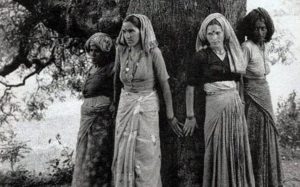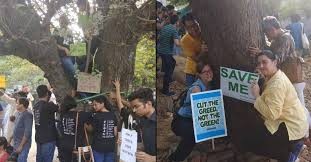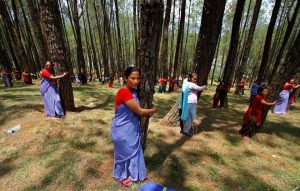The Chipko movement had started in the early 18th century in Rajasthan. Chipko means “hugging” – hugging the trees, saving them from falling. A local woman, Amrita Devi, risked her life along with 84 villagers to protect the forest trees from being cut down as ordered by the Jodhpur’s Maharaja. The lady was not educated, but she knew the importance of the ecological balance. But soon after the movement he gave a royal decree preventing cutting of trees in all Bishnoi villages. The Bishnois are known to respect the trees, they are known for their reverence for nature.
Deforestation doesn’t only mean the loss of trees to the farmers, but it also means loss of fodder, firewood, and drinking and irrigation water. Hence, the protests against cutting of trees began when the trees were increasingly cut down for commercial and industrial purposes.
March 26th each year is celebrated as Chipko Movement day; tomorrow will be 46th anniversary. Chipko Movement got its name from the way people embraced the trees to protect them from being cut. It gathered movement in April 1973 in Uttarakhand’s Mandal village (then a part of Uttar Pradesh) in the upper Alakananda valley. Soon it spread to other Himalayan districts of the state. The Chipko Movement was triggered by a government decision to allot forest land to a sports goods company. Angered by the move, villagers formed circles around the trees to prevent them from being cut. The Chipko Movement, leaded by local women, was lead by Chand Chandi Prasad Bhatt and his NGO “Dasholi Gram Swarajya Sangh”. Some of the key figures that were part of the Chipko Movement were Dhoom Singh Negi, Bachni Devi, Gaura Devi and Sudesha Devi.
The man famous for the continuing the Chipko Movement Sunderlal Bahuguna is a noted environmentalist; when he heard about the cutting down of trees in the Himalayan region, he decided to take charge along with the other villagers. Sunderlal Bahuguna gave a direction to the movement and his appealed to Indira Gandhi; the then Prime Minister of India, his movement resulted in the ban of cutting trees. Bahuguna is also known for coining the Chipko slogan ‘ecology is permanent economy’. Ecology deals with the energy and matter related to life and the Earth, it also deals with the human economy. Ecological economists argue that when environment is not respected by mankind, it revolts back man’s advancements in form of floods, tsunami and earthquakes. Ecology is very close to human economy.
Chipko movement is concerned with the preservation of forests and thereby with the maintenance of the traditional ecological balance in the sub-Himalayan region, where hill people have traditionally enjoyed a positive relationship with their environment. Thus, it strives to maintain the traditional status quo between the people and the environment. Its proponents have tried to demonstrate that the past and present forest policies of the Indian Government have negatively affected the ecological balance of the area and caused the uprooting of indigenous people who previously depended on forest for their survival and who preserved the forest by maintaining a strong bond of worship and love toward it.
The Chipko Movement, which has now spread from one end of the Himalayas in Kashmir to the other in Arunachal Pradesh, is endeavoring to alter the Government’s forest policy by insisting on maintenance of the traditional status quo in the Himalayan and other forest regions of India. In this sense, there is resistance to change and to an opening up of the area for technological development.
In fact, our religion respects ecology; for example in Gudi Padwa or Ugadi is the day on which mother earth was created and therefore it is the birthday of our mother earth that needs to be celebrated and rejoiced by all, on this precious day we celebrate “NEEM DAY” also. Chaitra Gudi Padwa is celebrated on the 1st day of the month of Chaitra. The wonder tree of India, Neem, is given lot of significance during this festival.
Vana Mahotsav is a program which was started by Kulapati Kanhaiyalal Munshi (KM Munshi), who was an Indian Independence Activist, politician, writer and educationist from Gujarat state. A lawyer by profession, he later turned to literature and politics. He was a well-known name in Gujarati literature. He founded Bharatiya Vidya Bhavan, an educational trust the then Indian Union Minister for Agriculture and Food to create enthusiasm among masses for forest conservation and planting trees. It is now a week-long program celebrated on different days in different parts of India, but usually 1st to 7th July. It began after a flourishing tree planting drive which was undertaken in Delhi, in which national leaders participated. The festival was simultaneously celebrated in a number of states in India. Since then, millions of saplings of diverse species have been planted with energetic participation of local people and various agencies like the forest department.
The famous Chipko Andolan (Hug the Trees Movement) of Uttarakhand in the Himalayas inspired the villagers of the Uttara Kannada district of Karnataka Province in southern India to launch a similar movement to save their forests. In September 1983, men, women and children of Salkani “hugged the trees” in Kalase forest. (The local term for “hugging” in Kannada is appiko.) Appiko Andolan gave birth to a new awareness all over southern India. The Appiko Movement is trying to save the Western Ghats by spreading its roots all over southern India.
While the total forest cover of the country has increased by 3, 775 sq km, the tree cover has gone up by 1, 306 sq km. According to the India State of Forest Report (ISFR) 2015 released, the total forest and tree cover is 79.42 million hectare, which is 24.16 percent of the total geographical area.
Defense projects, dams and mining projects get most of the forest land. Compensatory forestation is not the answer to rampant deforestation as the diversity in forest is lost when only a certain type of trees is planted as ‘compensation’. It’s the collapse of an ecosystem. The rate at which urbanization is taking place, trees are being felled, widespread encroachment, are the factors contributing to climate change and increase in pollution, choking urban dwellers.
Perhaps it is time that we learn a little more from the heroes of Chipko movements and be more considerate towards protecting the environment.















































